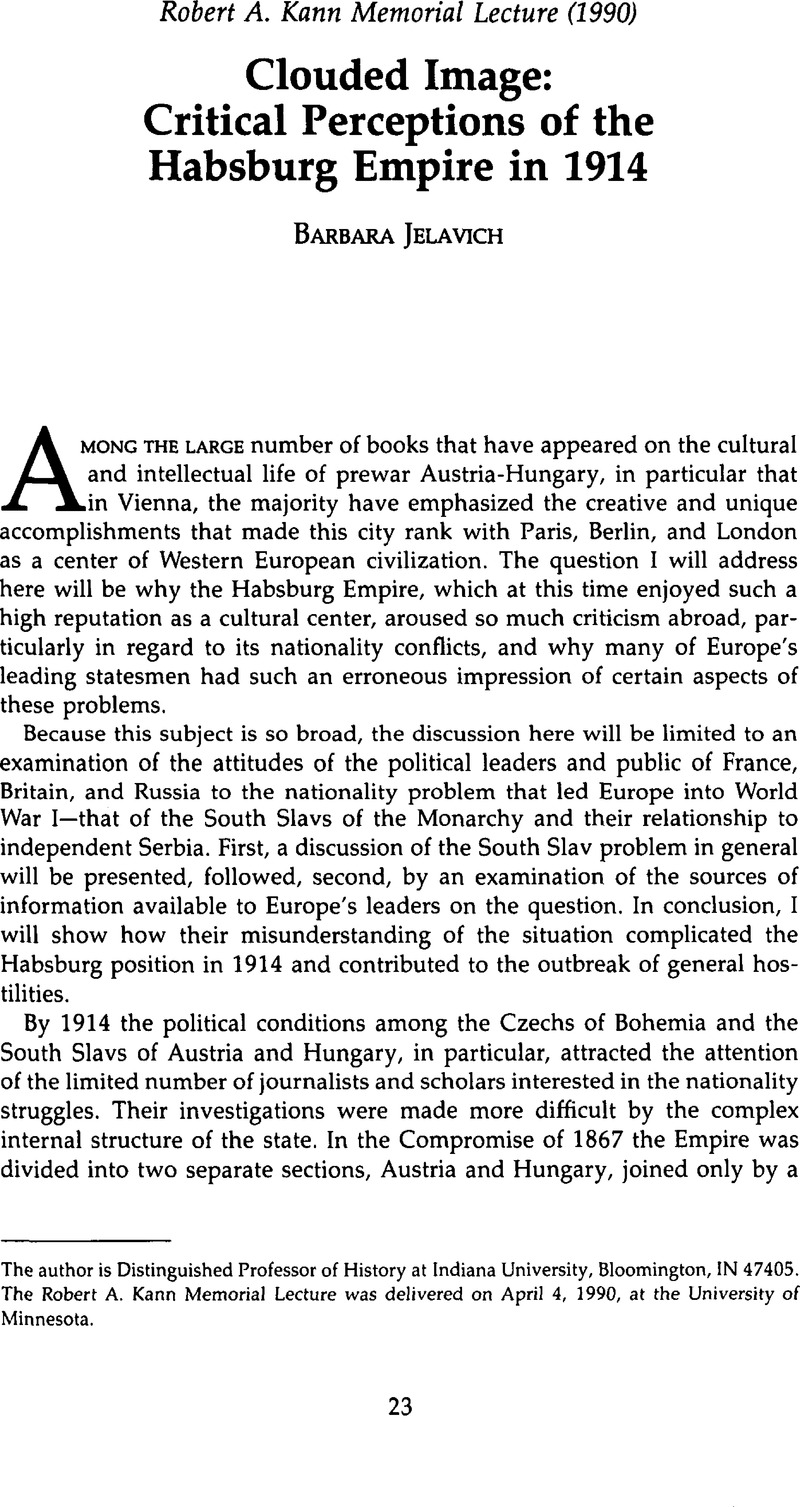Article contents
Clouded Image:Critical Perceptions of the Habsburg Empire in 1914
Published online by Cambridge University Press: 10 February 2009
Abstract

- Type
- Robert A. Kann Memorial Lectures: 1990
- Information
- Copyright
- Copyright © Center for Austrian Studies, University of Minnesota 1992
References
1. See Jelavich, Charles, South Slav Nationalisms: Textbooks and Yugoslav Union before 1914 (Columbus: Ohio University Press, 1990)Google Scholar.
2 For French views before 1914, see in particular Becker, Jean-Jacques, 1914:Comment les Français sont entrés dans la guerre (Paris: Presses de la fondation nationale des sciences politiques, 1977)Google Scholar, and Keiger, John F. V., France and the Origins of the First World War (New York: St. Martin's Press, 1983)CrossRefGoogle Scholar.
3 Malet, Albert, Histoire de France de 1789 å 1875 (Paris: Hachette, 1912), 533Google Scholar.
4 Lavisse, Ernest and Rambaud, Alfred, eds., Histoire générate du IV' siècle a nos jours (Paris: Armand Colin, 1897), 9:697Google Scholar.
5 Paléologue, Maurice, Au Quai d'Orsay: Journal, 1913–1914 (Paris: Plon, 1947), 5Google Scholar.
6 See Dumaine, Alfred, La derniére ambassade de France en Autriche (Paris: Plon, n.d.)Google Scholar.
7 For the British position see in particular Bridge, F. R., Great Britain and Austria-Hungary, 1906–1914: A Diplomatic History (London: Weidenfeld and Nicolson, 1972)Google Scholar, and his article “British Official Opinion and the Domestic Situation in the Hapsburg Monarchy, 1900–1914,” in Shadow and Substance in British Foreign Policy, 1895–1939, ed. McKercher, B. J. C. and Moss, D. J. (Edmonton: University of Alberta Press, 1984), 77–113Google Scholar; Hanak, Harry, Great Britain and Austria-Hungary during the First World War: A Study in the Formation of Public Opinion (London: Oxford University Press, 1962)Google Scholar; and Steiner, Zara S., Britain and the Origins of the First World War (New York: St. Martin's Press, 1977)CrossRefGoogle Scholar.
8 Grey to Graz, Des, London, June 11/24, 1915, Mezhdunarodnye otnosheniia v epokhu imperializma (Moscow: Gosudarstvennoe sotsial'no-ekonomicheskoe izdatel'stvo, 1933–1935), 3rd sen, 8:1, 300–307Google Scholar.
9 Ward, A. W., Prothero, G. W., and Leathes, Stanley, eds., The Cambridge Modern History (Cambridge: Cambridge University Press, 1910), 174–212Google Scholar.
10 For Wickham Steed and Seton-Watson see in particular, Hanak, Great Britain and Austria-Hungary, 11–35; May, Arthur J., “R. W. Seton-Watson and British Anti-Hapsburg Sentiment,” Slavic and East European Review 20 (1961): 40–54CrossRefGoogle Scholar; and Miller, Nicholas J., “R. W. Seton-Watson and Serbia during the Reemergence of Yugoslavism, 1903–1914,” Canadian Review of Studies in Nationalism 15:1–2 (1988): 59–69Google Scholar. See also Seton-Watson, Hugh, Seton-Watson, Christopher et al. , eds., R. W. Seton-Watson and the Yugoslavs: Correspondence, 1906–1941 (Zagreb: Grafiĉki zavod Hrvatske, 1976), vol. 1Google Scholar.
11 See in particular Steed, Henry Wickham, The Hapsburg Monarchy (London: Constable, 1916), 282–89Google Scholar. In his memoirs Steed commented: “I had not been long in Vienna before I realized that the question of Serbia was regarded in Austria-Hungary in much the same way as the questions of German and of Italian unity had been regarded in the middle of the 19th century. Fully two thirds of the Serbo-Croat, or Southern Slav, race were ruled by the Hapsburg Crown. A movement toward unity existed among them, and it was indispensable that, if it could not be thwarted, it should, unlike the Italian and German unitary movements, be accomplished under Hapsburg auspices.” Steed, Henry Wickham, Through Thirty Years, 1892–1922: A Personal Narrative (Garden City, N.Y.: Doubleday, Page, 1924), 1:201–2Google Scholar.
12 Seton-Watson, R. W., The Southern Slav Question and the Habsburg Monarchy (London: Constable, 1911), 335Google Scholar.
13 Ibid., 336–37.
14 For the general background for the period see Lieven, D. C. B., Russia and the Origins of the First World War (New York: St. Martin's Press, 1983)CrossRefGoogle Scholar. Russian-Serbian relations are discussed in Jelavich, Barbara, “Tsarist Russia and the Balkan Slavic Connection,” Canadian Review of Studies in Nationalism 16: 1–2 (1989): 209–26Google Scholar, and “When Diplomats Fail: Austrian and Russian Reporting from Belgrade, 1914,” Occasional Paper no. 20, East European Program, The Wilson Center, Washington, D.C.; and Russia's Balkan Entanglements, 1806–1914 (New York: Cambridge University Press, 1991), 197–265.
15 Popović to the Serbian Foreign Ministry, telegram, St. Petersburg, December 14/27 1913, Bogićević, Miloš, Die auswärtige Politik Serbiens, 1903–1914 (Berlin: Brückenverlag, 1928, 1929), 1:279–80Google Scholar.
16 Popović to the Serbian Foreign Ministry, St. Petersburg, January 31/February 13, 1913, ibid., 1:298–99.
17 Sazonov to Hartwig, St. Petersburg, April 23/May 6, 1913, ibid., 2:408–10.
18 See the text of the ultimatum in Bittner, Ludwig and Uebersberger, Hans, eds., Oesterreich-Ungarns Aussenpolitik von der bosnischen Krise 1908 bis zum Kriegsausbruch 1914 (Vienna: Oesterreichischer Bundesverlag, 1930), 8:515–17Google Scholar.
19 Grey, Viscount of Fallodon, , Twenty-Five Years, 1892–1916 (New York: Frederick A. Stokes, 1925), 299–300Google Scholar.
20 Grey to Bunsen, tel. no. 148, Foreign Office, July 24, 1914, Gooch, G. P. and Temperley, Harold, eds., British Documents on the Origins of the War, 1898–1914 (London: His Majesty's Stationery Office, 1926), 11:73–74Google Scholar.
21 Grey to Bunsen, no. 124, Foreign Office, July 27, 1914, ibid., 11:129–30.
22 George, David Lloyd, War Memoirs (London: Ivor Nicholson & Watson, 1933), 1:56Google Scholar.
23 Dumaine to Bienvenu-Martin, no. 102, Vienna, July 22, 1914, Ministére des Affaires Etrangéres, Documents diplomatiques français, 1871–1914 (Paris: Imprimerie nationale, 1900–1936), 3rd ser, 10:784–85Google Scholar.
24 On the situation in Belgrade and on Descos in particular see Barbara Jelavich, “France, the Habsburg Empire, and the South Slav Question, 1914,” Etudes danubiennes (Strassbourg), in press.
25 Szápáry to Berchtold, telegram, St. Petersburg, July 24, 1914, Oesterreich-Ungarns Aussenpolitik, 8:645–46.
26 Schebeko, Nikolai Nikolaevich [Shebeko], Souvenirs (Paris: Bibliothèque diplomatique, 1936), 255–57Google Scholar.
27 Nicholas, II to William, II, telegram, 07 15/28, 1914, Mezhdunarodnye otnosheniia v epokhu imperializma, 3rd ser., 3:5, 181Google Scholar.
- 1
- Cited by


